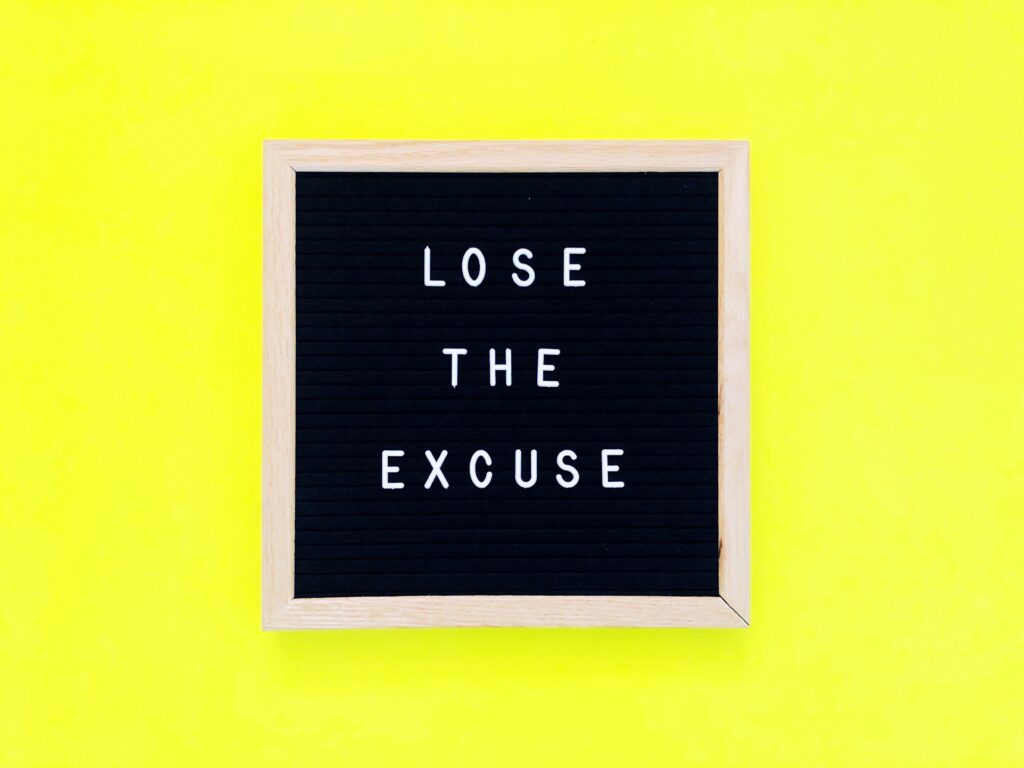5 Steps to Take for a Life Free of No More Excuses
Are you sick of making excuses for why you can’t get things done? Are you ready to take action and commit to a life free of no more excuses? If so, then this blog post is for you!
Here, we will discuss five key steps to help you break the cycle of excuses and become more productive. With these steps, you’ll be able to start taking responsibility for your actions and create a life full of successes and accomplishments. So, let’s get started!
Breaking the Cycle of Excuses

We’ve all been there. We come up with a list of reasons why we can’t accomplish our goals or complete our tasks.
It’s a never-ending cycle of excuses that holds us back from achieving our full potential. But it doesn’t have to be this way. It’s time to break free from the cycle of excuses and start taking control of our lives.
Breaking the cycle of excuses starts with recognizing that we are the only ones standing in our own way. It’s about taking responsibility for our actions and realizing that we have the power to change our circumstances. It’s about stepping out of our comfort zones and facing the challenges head-on.
One of the key steps to breaking the cycle of excuses is identifying the underlying fears and limiting beliefs that are holding us back. We must be honest with ourselves and confront these fears and beliefs in order to move forward.
Once we have identified our fears and limiting beliefs, it’s time to commit to change. We must make a conscious decision to overcome these obstacles and refuse to let them define us. This commitment requires discipline and perseverance, but the rewards are well worth it.
Breaking the cycle of excuses also requires us to make a plan of action. We must set clear goals and establish a roadmap to success. This plan should be realistic and achievable, allowing us to track our progress and make adjustments along the way.
In order to hold ourselves accountable, it’s important to establish a system of checks and balances. This can include setting deadlines, enlisting the support of others, or even hiring a coach or mentor. By having someone or something to hold us accountable, we are less likely to make excuses and more likely to follow through on our commitments.
Facing Your Fears and Limiting Beliefs

One of the most crucial steps in breaking the cycle of excuses is facing our fears and limiting beliefs head-on.
We all have them, those little voices in our heads that tell us we’re not good enough, smart enough, or capable enough. These fears and beliefs hold us back from pursuing our dreams and reaching our full potential.
To break free from this cycle, we must first identify these fears and limiting beliefs. Take a moment to reflect on what thoughts come up when you think about taking a leap of faith or trying something new. Are you afraid of failure? Do you believe you’re not worthy of success? Write these thoughts down and acknowledge their existence.
Once you’ve identified your fears and limiting beliefs, it’s time to challenge them. Ask yourself, “Are these thoughts based on facts or just assumptions?” Often, we create these limiting beliefs based on past experiences or what others have told us. But remember, your past does not define your future.
Replace these negative thoughts with positive affirmations and empowering beliefs. Instead of thinking, “I can’t do it,” say to yourself, “I am capable of achieving anything I set my mind to.” Practice this positive self-talk daily, and over time, you’ll start to believe it.
Committing to Change

Committing to change is a vital step in breaking the cycle of excuses and taking control of our lives.
It requires a conscious decision to let go of old patterns and embrace new ones that align with our goals and aspirations. But it’s important to remember that change doesn’t happen overnight; it’s a process that requires patience and perseverance.
To commit to change, start by clarifying your intentions and identifying the areas of your life where you want to see improvement. Set clear and specific goals that are realistic and attainable. Break them down into smaller, actionable steps that you can take on a daily or weekly basis.
Next, create a plan of action that outlines how you will achieve these goals. This plan should include strategies and tactics that will help you overcome any obstacles or challenges that may arise. Be proactive and stay committed to your plan, even when things get tough.
As you commit to change, it’s essential to stay accountable to yourself. Hold yourself responsible for your actions and track your progress along the way. Celebrate your victories and learn from your setbacks. Consider enlisting the support of a friend, mentor, or coach who can provide guidance and hold you accountable to your goals.
Finally, commit to self-care and prioritize your well-being throughout this process. Taking care of yourself physically, mentally, and emotionally will provide you with the energy and resilience you need to stay committed to change.
Making a Plan of Action

Now that you’ve identified your fears and limiting beliefs and have committed to breaking the cycle of excuses, it’s time to make a plan of action. This step is crucial in turning your intentions into tangible results.
Start by setting clear and specific goals that align with your aspirations. These goals should be realistic and achievable, allowing you to track your progress and make adjustments along the way. Break them down into smaller, actionable steps that you can take on a daily or weekly basis.
Once you have your goals in place, it’s time to create a roadmap to success. This plan should outline the strategies and tactics you will implement to overcome any obstacles that may arise. Be proactive and stay committed to your plan, even when faced with challenges.
Remember, flexibility is key. As you progress on your journey, you may need to make adjustments to your plan to ensure you stay on track. Don’t be afraid to pivot and try new approaches if something isn’t working.
Holding Yourself Accountable

Taking responsibility for your actions is essential in breaking the cycle of excuses and creating a life free of limitations.
Accountability is about being honest with yourself and owning up to your choices and their consequences. It’s about staying true to your commitments and following through on your goals, even when it’s difficult or inconvenient.
To hold yourself accountable, start by setting clear expectations and deadlines for your tasks and goals. Write them down and make them visible, whether it’s on a calendar, a to-do list, or a vision board. This visual reminder will help you stay focused and motivated.
Next, establish a system of checks and balances. This can be done by enlisting the support of a friend, family member, or mentor who will hold you accountable. Share your goals and progress with them, and allow them to provide constructive feedback and encouragement. Their presence will keep you on track and motivated to follow through.
Another powerful way to hold yourself accountable is to track your progress regularly. Keep a journal or use a habit tracking app to record your daily actions and accomplishments. This way, you can identify any patterns or areas where you may be falling behind and make the necessary adjustments.
Lastly, remember to celebrate your victories, no matter how small. Acknowledge and reward yourself for meeting your goals and milestones. This positive reinforcement will strengthen your motivation and build momentum towards a life of no more excuses.
Developing Positive Habits

Developing positive habits is an essential step in breaking the cycle of excuses and creating a life of productivity and success. Positive habits are the foundation for achieving your goals and maintaining a balanced and fulfilling life.
To develop positive habits, start by identifying the behaviors and routines that align with your goals and priorities. These can include practices such as regular exercise, healthy eating, consistent sleep patterns, and effective time management. Make a commitment to incorporate these habits into your daily life, even if it means starting small and gradually building up.
Consistency is key when it comes to developing positive habits. Set specific goals for each habit and create a routine that supports their implementation. Consistently practice these habits day after day, even when you don’t feel motivated or when obstacles arise. Over time, they will become ingrained in your daily life and feel like second nature.
It’s also important to practice self-discipline and self-care in developing positive habits. Be kind and patient with yourself during the process. Celebrate your progress and forgive yourself for any slip-ups along the way.
Remember that developing positive habits is a journey, and every small step forward is a step closer to a life free of excuses and filled with accomplishments.
Ready to sell your property? Give us a call today and learn more about our professional photography services and marketing that can boost your property listing!
Plus, explore our virtual assistant coaching program to level up your business. Don’t forget to tune into our new podcast for even more valuable insights!
